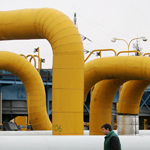Registration
Thank you!
You will receive an email confirming your registration.
IMGXYZ1091IMGZYX Russia has threatened to cut gas supplies to Ukraine on January 1st if a $2 billion gas debt is not resolved, and both countries stand to lose if they fail to reach a settlement in time. Carnegie experts in Washington and Moscow discuss the implications of the dispute for regional stability, European energy security, and Russia’s relations with the West.
Key points:
- Both Russia and Ukraine stand to lose if they fail to reach a settlement: Russia will look brutal and ruthless; Ukraine’s reliability as a supplier to Europe will be called into question and its squabbling leadership will lose credibility domestically and abroad.
- Russia, concerned about European perceptions of its actions, does not want a showdown. After the August war in Georgia, and the resulting chill in relations between Russia and the West, the Kremlin wants to project a less aggressive image.
- Though Ukrainian political elites are embroiled in a power struggle, all sides want the crisis solved—but to their advantage—and none want to alienate Europe.
- The global economic crisis adds urgency to the negotiations: Gazprom, strapped for cash, can’t afford financial losses from the European financial gas trade. Ukraine received a $16 billion IMF bailout and the government predicts a GDP contraction next year, thus can’t afford to pay higher prices.
- A cutoff is likely, but it will probably catalyze both sides to reach an agreement shortly thereafter. Ukraine has enough gas stored that disruptions to European supply will be minor.
